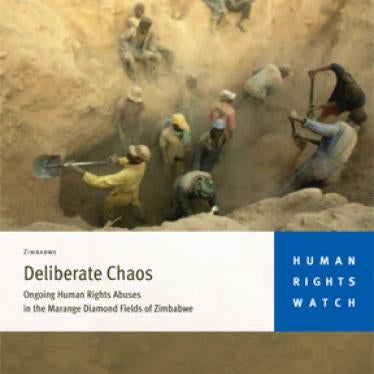Today in Tel Aviv, Israel will lead an international meeting of nearly 50 countries, along with many of the world’s top diamond companies and several international non-governmental organizations, to discuss the fight against “blood diamonds.” The Israeli Ministry of Trade and Industry will be charged with convening this diverse group and orchestrating an agreement. This year, Israel chairs the Kimberley Process Certification Scheme, the international diamond monitoring body designed to prevent “blood diamonds” from entering the market.
Israel is taking the reins just as one big issue threatens to undermine the whole delicate process of monitoring the $15 billion diamond business: what to do about Zimbabwe.
Ruled by a corrupt old dictator who has driven his country’s economy into the ground, Zimbabwe is a mess. But President Robert Mugabe, now in his late 80’s, is enjoying an unexpected windfall. The Marange diamond fields in the eastern part of the country, grabbed by the Zimbabwean military less than two years ago, may prove to be one of the most significant new sources of diamonds in the world today. Proceeds from Marange are now helping to keep Mugabe and his political party, ZANU-PF, in power.
If the Kimberley Process is meant to stop “blood diamonds,” then stones from Marange surely qualify for that grave categorization. According to extensive research conducted by Human Rights Watch in and around Marange last year, more than 200 people were killed when the military took over the diamond fields at the end of 2008. The lives of villagers in the surrounding territory are now a misery: they are constantly forced to work at gunpoint by soldiers who beat and even torture them if they refuse. Children are not spared. Schools have closed because soldiers are billeted in them, and even young kids are forced to dig at their behest.
What is the Kimberley Process going to do about it? Along with the United States, the United Kingdom, and several other Western governments, Israel has been sharply critical of the Zimbabwean government’s behavior. Leading diamond traders in Israel have told Human Rights Watch the same thing: if Zimbabwean diamonds are bloody, get them off the market.
But not everyone arriving in Tel Aviv this week agrees on how best to do that. The Kimberley Process was formed after rebel forces in West Africa had financed many years of warfare through the sale of diamonds from the territories they seized in the 1990’s. Western consumers, particularly from the United States which accounts for more than half of retail diamond purchases, didn’t like the idea that their engagement rings were underwriting civil conflicts in which the arms and ears of civilians were being chopped off. The movie “Blood Diamond,” starring Leonard DiCaprio, gave the issue an added boost.
However, the governments who initially formed the Kimberley Process agreed only to exclude diamonds that were financing rebel groups. They didn’t include diamonds that were financing abusive governments – although obviously, as a practical matter, it hardly matters who the soldier who is beating you is working for. But many members of the Kimberley Process have questionable human rights records of their own, and they don’t want to suspend Zimbabwe from the group.
Members of the Kimberley Process know what’s going on. They’ve read the reports from Human Rights Watch and other groups, and their own fact-finding mission to Zimbabwe last summer confirmed the basic story. But now, its own monitor on the ground in Zimbabwe has stepped forward to muddy the waters. Deputized by the Kimberley Process last fall to report back on whether Zimbabwe diamonds could be certified as “clean,” the monitor, an eminent South African diamond expert named Abbey Chikane, last week issued a report giving Zimbabwe the thumbs-up.
Still, the circumstances of his visit seemed murky at best. A Zimbabwean civil society activist who met with Chikane is now in prison for possession of leaked official documents on the presence of the military in Marange. Chikane himself announced that his personal effects had been searched without his permission, and confidential materials compromised.
Achieving consensus – the only way to move things forward in the Kimberly Process – amid this tangle of conflicting charges will not be easy. But as Israel prepares for its first meeting as chair, one hard and fast rule must be remembered: the economy does not lie. If consumers think Zimbabwean gems are “blood diamonds,” the shenanigans of the Kimberley Process will not make a difference. The Israeli chair needs to keep consumer confidence as the fixed point on his compass. He can still pull a human rights success out of the Kimberley Process.






